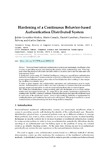Mostrar o rexistro simple do ítem
Hardening of a Continuous Behavior-based Authentication Distributed System
| dc.contributor.author | González-Muñoz, Julián | |
| dc.contributor.author | Casado, Mario | |
| dc.contributor.author | Garabato, D. | |
| dc.contributor.author | Nóvoa, Francisco | |
| dc.contributor.author | Dafonte, Carlos | |
| dc.date.accessioned | 2023-11-10T19:11:50Z | |
| dc.date.available | 2023-11-10T19:11:50Z | |
| dc.date.issued | 2023 | |
| dc.identifier.uri | http://hdl.handle.net/2183/34159 | |
| dc.description | Cursos e Congresos, C-155 | es_ES |
| dc.description.abstract | [Abstract] Password-based traditional authentication systems are increasingly insufficient when it comes to providing security and checking the identity of the authenticated user. What happens when the password of an user has been stolen or an active user is not the same user who authenticated firstly? A distributed system using AI (Artificial Intelligence) acting as a second factor authentication method by analyzing user’s mouse events has to provide confidentiality and integrity in order to protect against different attacks such as Man-In-The-Middle that allow sniffing or data tampering, resulting in an identity spoof. In order to grant integrity and confidentiality, encryption and authentication must be implemented. Authentication is used to allow one node to produce or consume data from an existent message stream and encryption in order to avoid exposing these data to external agents. PKI (Public Key Infrastructure) system is widely used over the internet, so it is a trusty authentication and encryption framework. By using PKI in this project, hardening is performed by creating with OpenSSL a trusted Certificate Authority that issues and signs the certificates used by each node in the distributed system. Trust in this Certificate Authority is implemented by creating keystores and truststores for each node with keytool. This project resulted in a secure communication system preventing data from being sniffed or tampered | es_ES |
| dc.description.sponsorship | Xunta de Galicia; ED431B 2021/36 | es_ES |
| dc.description.sponsorship | Xunta de Galicia; ED431G 2019/01 | es_ES |
| dc.description.sponsorship | Thisworkwas funded by the Spanish MCIN/AEI/10.13039/501100011033 and EuropeanUnion Next Generation EU/PRTR through grant TED2021-130492B-C21 and the Galician Regional Government, Xunta de Galicia, through grants ED431B 2021/36 and ED431G 2019/01 | |
| dc.language.iso | eng | es_ES |
| dc.publisher | Universidade da Coruña, Servizo de Publicacións | es_ES |
| dc.relation | info:eu-repo/grantAgreement/AEI/Plan Estatal de Investigación Científica y Técnica y de Innovación 2021-2024/TED2021-130492B-C21/ES/DESARROLLO DE UNA TECNOLOGÍA DE IA PARA LA AUTENTICACIÓN DE USUARIOS BASADA EN EL COMPORTAMIENTO | es_ES |
| dc.relation.uri | https://doi.org/10.17979/spudc.000024.31 | |
| dc.rights | Attribution 4.0 International (CC BY 4.0) | es_ES |
| dc.rights.uri | https://creativecommons.org/licenses/by-nc-sa/4.0/deed.es | * |
| dc.subject | Inteligencia artificial | es_ES |
| dc.subject | Falsificación de identidad | es_ES |
| dc.subject | Autenticación | es_ES |
| dc.subject | Cifrado | es_ES |
| dc.subject | Sistema PKI | es_ES |
| dc.title | Hardening of a Continuous Behavior-based Authentication Distributed System | es_ES |
| dc.type | info:eu-repo/semantics/conferenceObject | es_ES |
| dc.rights.access | info:eu-repo/semantics/openAccess | es_ES |
| UDC.startPage | 197 | es_ES |
| UDC.endPage | 201 | es_ES |
| UDC.conferenceTitle | VI Congreso Xove TIC: impulsando el talento científico. Octubre, 2023, A Coruña | es_ES |






